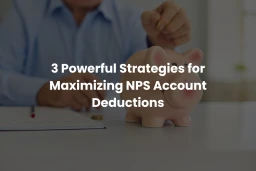A Guide to Tax Planning for Salaried Employees
Your paycheck is a big deal, and so are taxes. If you have a regular salary, understanding your money before taxes is crucial. Think of your salary before taxes as the starting point for managing your finances. Smart tax planning isn't just about following rules – it's about knowing your money inside out. This guide will help you figure out your salary, navigate taxes, and make savvy choices for a better financial future.

3 Steps to Smart Tax Planning as a Salaried Employee
Your salary isn't just a number – it's a potential source of savings. Understanding the details can help you maximize your take-home pay while minimizing your tax obligations. Here's a breakdown:
Exemptions in Your Salary:
Certain components of your salary come with valuable exemptions and deductions as per the Income Tax Act. You have the opportunity to claim deductions or exemptions for perks, perquisites, and tangible benefits within specified limits. Here are a few illustrations:
House Rent Allowance (HRA): If you're renting a place and paying rent, you qualify for an exemption under HRA (section 10(13A)).
Education Allowance: You can claim allowances for your children's education, with provisions for up to Rs.100 per month per child (maximum of two children) and up to Rs.300 per month for hostel stays, as per section 10(14).
Leave Travel Allowance (LTA): This allowance allows for two trips within a block of four years. The exemption limit for air travel is the economy class airfare or the actual amount spent, whichever is less. For rail travel, it's the air-conditioned first-class rail fare or the amount spent, whichever is less.
Smart Investments for Tax Benefits:
When aiming to boost your take-home pay and minimize your tax burden, focus your efforts on Section 80C - a treasure trove offering potential tax benefits of up to Rs.150,000. This translates to a substantial tax reduction of Rs.45,000 for those falling within the 30% tax bracket (excluding surcharge and cess).
Key essentials to target include Life Insurance and Employee Provident Fund (EPF), both falling under the 80C umbrella. Your life insurance premiums, EPF contributions, and school fees contribute to this tax-saving avenue.
If you're in the process of repaying a home loan, seize the opportunity to claim a deduction for principal repayment under section 80C. Additionally, leverage tax perks outlined in section 24 for interest payments on your home loan, up to Rs.2,00,000 in a financial year.
Taking care of your health comes with added financial benefits. Deductible medical insurance premiums can reach up to Rs.25,000 annually, covering you, your spouse, and dependent children (Rs.30,000 if the insured is 60 years or older), as specified in section 80D.
Filing Taxes Made Easy:
Don't stress about tax season. File your Income Tax Return (ITR) well before the deadline using the income tax department website or other user-friendly ITR portals. Filing accurately is crucial for effective tax planning, securing your financial well-being.

Tax Benefits Associated with Personal Loans
While personal loans generally don't offer specific tax benefits, there are situations in India where you could potentially make eligible claims based on the purpose of the loan. The crucial factor lies in how you utilize the loan amount. By maintaining proper documentation to substantiate the funds' intended use, you may unlock tax advantages in the following scenarios:
Home Improvement: If you use a personal loan to enhance your home, you can qualify for a tax deduction under Section 24(b) of the Income Tax Act. This allows you to reduce your taxable income by up to Rs.30,000 annually, based on the interest paid on the personal loan.
Home Ownership (or Rental): Acquiring a loan for purchasing or building a house enables you to claim a deduction on the interest paid. If it's your residence, you can avail up to Rs.2,00,000 off. If the property is rented out, the entire interest amount becomes a tax deduction.
Education Financing: Taking a personal loan to fund education expenses (for yourself, your spouse, or your children) can make you eligible for tax deductions under Section 80E. These deductions are applicable for up to eight years or until the loan is repaid, whichever occurs earlier.
Business Ventures: Initiating or investing in a business using a personal loan may qualify you for a tax break. You can claim the interest as a business expense under Section 37 of the Income Tax Act. It's a favorable provision for business endeavors.
Key Considerations for Effective Tax Planning
Below are some of the key considerations of effective tax planning:
Prioritize Financial Needs: Ensure your immediate and mid-term financial requirements are met, keeping in mind the typical minimum lock-in period of 5 years for most investments.
Diversify Investment Exploration: Explore various investment opportunities before making decisions. Strive for a balance between returns and tax savings, avoiding the sacrifice of one for the other.
Understand Investment Parameters: Have a clear understanding of an investment's purpose, gestation period, and maturity terms and conditions.
Strategic Timing is Crucial: Recognize that tax planning is not a year-end rush. Avoid hastily investing in tax-saving schemes that may not yield future benefits. A well-managed and strategically timed approach is the key to savvy tax planning.
Also read: How to Increase Your Credit Card Limit?
The Bottom Line
Don't wait for the last minute; start your tax planning journey today. Whether it's maximizing exemptions or making smart investments, every rupee saved is a rupee earned. So, here's to smart tax planning and a brighter financial future! Cheers to keeping more of your paycheck!
Follow us on Instagram.









